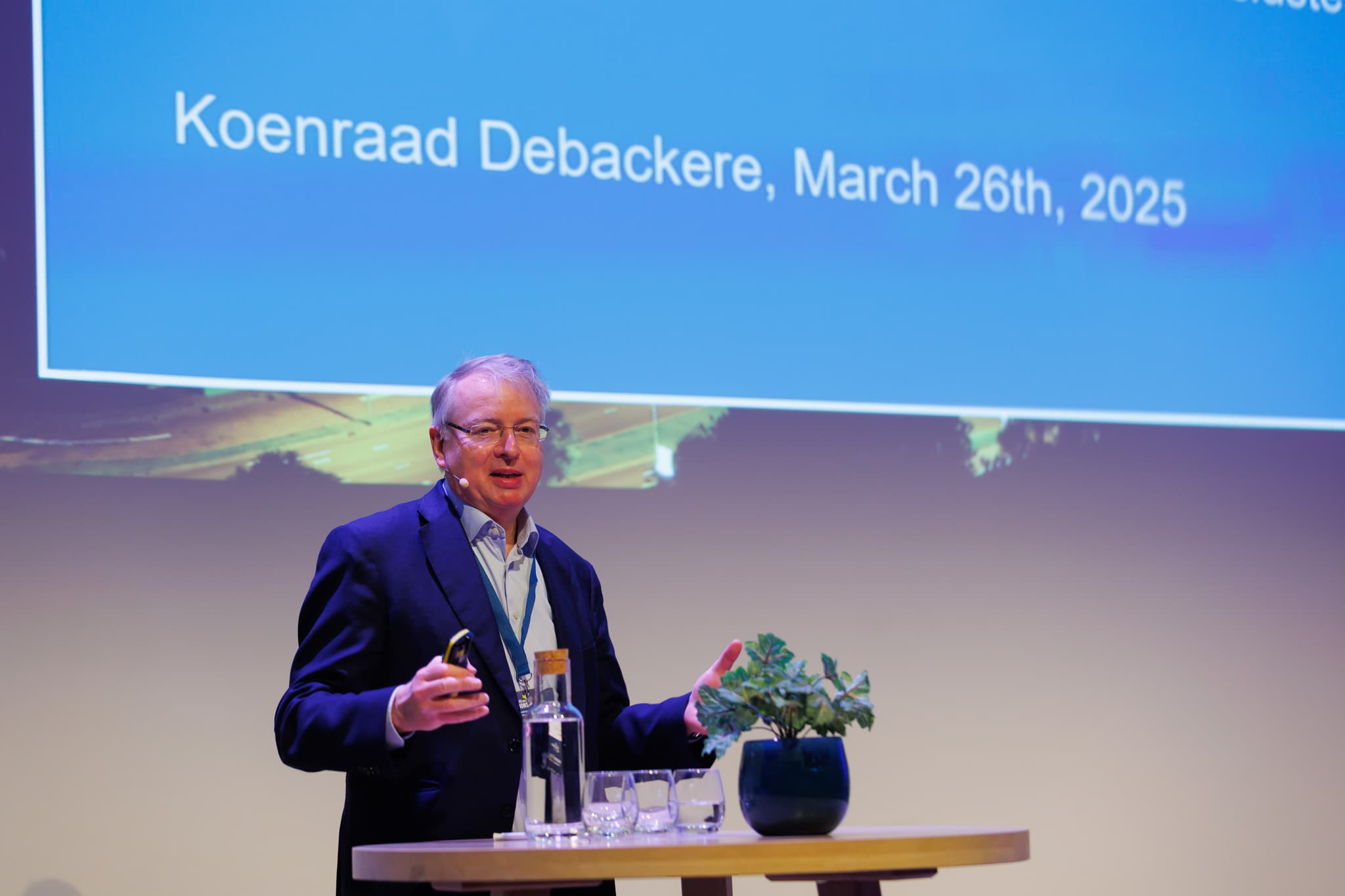Clusters as engines of innovation: the Leuven Model shows the way
At the Clusters Meet Regions event, Koenraad Debackere (KU Leuven) emphasized the vital role of science, entrepreneurship, and capital.
Published on April 7, 2025

Koenraad Debackere, © Bram Saeys
Bart, co-founder of Media52 and Professor of Journalism oversees IO+, events, and Laio. A journalist at heart, he keeps writing as many stories as possible.
“Science is a fundamental foundation,” Koenraad Debackere, Executive Director of KU Leuven Research & Development, began his keynote at the Clusters meet Regions event in Eindhoven. “And science is not just universities. It’s R&D-intensive startups. It’s R&D-intensive enterprises. It’s the entire ecosystem.”
Debackere, who also serves as Vice Chairman of Leuven MindGate (Belgium), drew from decades of experience in building one of Europe’s most vibrant innovation ecosystems. His message was both pragmatic and aspirational: clusters matter - and they must be built deliberately, collaboratively, and with a long-term view.
A European way of clustering
Returning from the U.S. early in his career, Debackere was struck by the differences in how ecosystems evolved. “In Boston, the environment takes care of everything you do in that cluster organization,” he recalled. “But Europe is different. And today, I think we can be proud to be different.”
That difference lies in Europe's ability to build linkages, not only within clusters but also between them. “Clusters must connect to one another,” he stressed. “Because no single region has everything. Complementarity is key.”
This philosophy is already evident in initiatives like the Eindhoven-Leuven-Aachen triangle, a cross-border cluster collaboration that originated two decades ago. “It’s probably getting more and more important going forward, given what should happen between clusters.”
Cognitive spillovers and entrepreneurial science
Throughout his talk, Debackere returned to the concept of “cognitive spillovers” - the mutual enrichment that occurs when science and business interact. “When we marry science and business, and that’s what a cluster organization should do, it’s not just about organizing research,” he said. “It’s about creating cognitive spillovers that enhance both science and innovation.”

Koenraad Debackere, KU Leuven © Bram Saeys
Research shows that university groups collaborating with industry produce better science. “Definitely in areas like technology, engineering, and electronics,” he noted. This insight has guided Leuven’s approach for decades.
“Clusters are foundational in making sure that scientists and businesses meet one another, formally and informally. That’s why we organize regular meetings at Leuven MindGate. We look for entrepreneurial scientists and entrepreneurial businesses. Entrepreneurship is the critical link between the two.”
Infrastructure, capital, and IP
But science and entrepreneurship alone are not enough. “Clusters are both digital and physical,” Debackere emphasized. “You need proximity. Lab space, office space, meeting space, incubator space, it all has to come together.”
Capital is another critical pillar. “We often look to government for subsidies, but what really matters is that we become attractive to venture capital and equity investors.” Leuven’s success in this regard is evident: over the past 25 years, it has become home to more than 20 private equity and VC funds.
A sophisticated approach to intellectual property matches this financial strength. “It’s not just about patents anymore,” Debackere explained. “It’s about copyrights, data ownership, and how you manage IP in an age of AI and data-driven innovation.”
The talent imperative
If there’s one theme Debackere returned to most passionately, it’s talent. “Talent, talent, talent,” he said. “How do you attract young, smart, entrepreneurial people? How do you keep established professionals? How do you draw in serial entrepreneurs?”
The answer, again, lies in creating a vibrant ecosystem. “If your cluster is dynamic and connected, talent will come. But you have to make space for students, too. In Leuven, we realized 15 years ago that our students were our most underutilized resource.”
That realization led to initiatives like Academics for Companies, where students consult with local businesses, and Academics for Development, where they help startups with prototype development. “It’s about building communities of students, entrepreneurs, and scientists,” Debackere said. “That’s how you grow a cluster.”
From science to market, and back again
Ultimately, clusters are judged by outcomes. “A scientific paper signals that knowledge is being developed,” Debackere acknowledged. “But a product, taken to market, is the real test.”
Leuven’s track record speaks volumes, with spin-offs and spin-outs thriving in sectors from semiconductors and biotech to medical devices and cybersecurity. “It’s not just about starting companies,” he added. “It’s about scaling them. That’s what supports European competitiveness.”
Cross-cluster collaboration: the next frontier
In closing, Debackere urged Europe’s regions to think beyond their borders. “We come from an era of big corporate R&D campuses. Today we live in a networked system, one where clusters must connect.”
He cited a recent MIT study highlighting the importance of closing value chain gaps through cluster collaboration. “You need clinical expertise from Leiden, cardiovascular research from Maastricht. You need components from one place and system integration from another. This is where Europe can shine - if we connect the dots.”
Quoting French poet Paul Morin, he offered a final piece of wisdom: “Le temps n’accepte pas ce qui se fait sans lui” - time does not accept what is done without taking time. “Don’t get frustrated,” Debackere advised. “Take the long view. That’s how you build ecosystems that last.”
